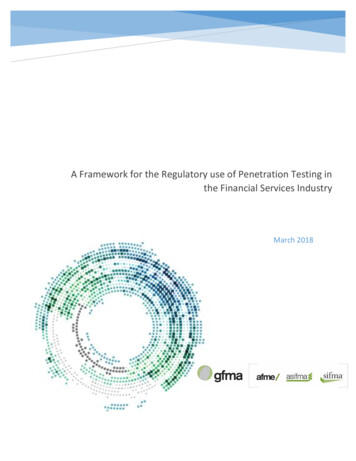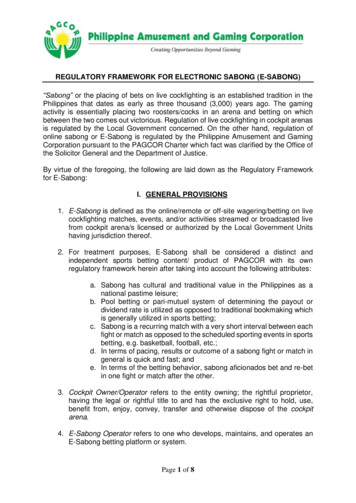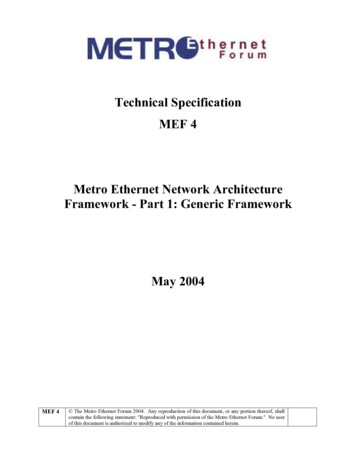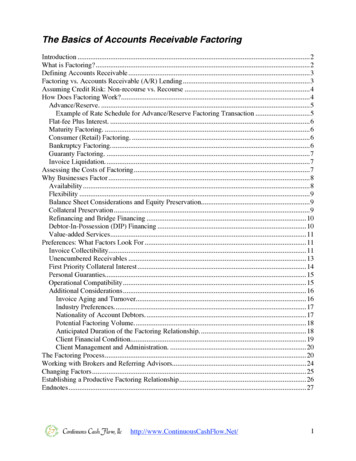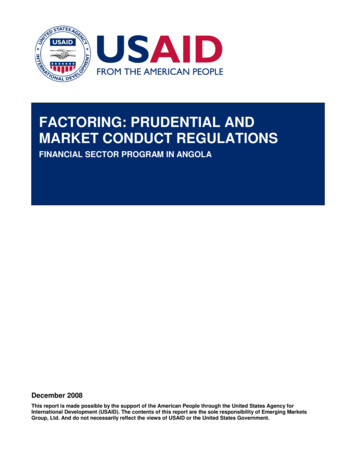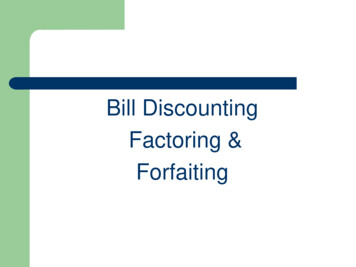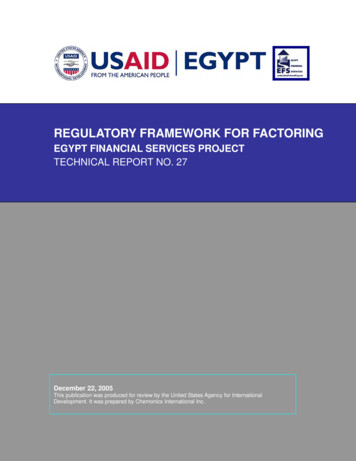
Transcription
REGULATORY FRAMEWORK FOR FACTORINGEGYPT FINANCIAL SERVICES PROJECTTECHNICAL REPORT NO. 27December 22, 2005This publication was produced for review by the United States Agency for InternationalDevelopment. It was prepared by Chemonics International Inc.
DATA PAGEActivity Title and Number:Egypt Financial Services (EFS) ProjectContract No. 263-C-00-05-00003-00Prepared for:EFS CTO: Gregg WiitalaEFS DCTO: Ingi LotfiEconomic Growth DivisionOffice of Financial and Information TechnologyUSAID/EgyptTask:Task 3: Develop Framework and Procedures for SecuredLending and New Financial InstrumentsKRA:KRA 3.2: Market and Regulatory Capacity Enhanced forNew InstrumentsActivity:Activity 3.2.8: Enhance the legal and regulatoryframework for financial leasing and factoringAuthor:Stephen Strauss, EFS ST Consultant andTask 3 Technical TeamDate:December 22, 2005List of Key Words Contained in Report:FactoringFactoring definitionsSample regulationsRegulatory frameworkRules and regulations for FactoringThe author’s views expressed in this publication do not necessarily reflect the views of theUnited States Agency for International Development or the United States Government.
Egypt Financial ServicesTable of ContentsIntroductionIPolicy Paper on Factoring1Comments on the Current Egyptian Factoring Regulations13Proposed Executive Regulations on Factoring16General Rules for Factoring in Egypt18Annex ASample Regulations for Factoring27Annex BSummary of Proposed Regulatory Framework for Factoring32Annex CMinimumCapital Requirements for Financial Seervices Entities36Annex DGeneral Rules for International Factoring39Annex EFactors Chain Interantional (FCI) Interfactor Agreement57Annex FSample Copy FCI Interfactor Agreement59Annex GRules of Arbitration promulgated by FCI83Annex HRules from edifactoring.com95Annex IConsultant’s Meeting Schedule101Annex JConsultant’s Scope of Work103Regulatory Framework for FactoringTechnical Report No. 28
INTRODUCTIONThe objective of this project on factoring in Egypt was to complete a set of new regulationsrelated to factoring, first in draft form for discussion with the EFS team and with thecounterpart, then in final form following discussions with the counterpart.As stated in the SOW of October 2005, these documents were therefore completed in twophases:Phase One (before coming to Cairo): Draft regulations and a Policy Paper were completedon October 30 and sent to EFS, then EFS distributed them to the advisory team and to thecounterpart.Phase Two (in Cairo): Following an meeting on November 20 with the counterpart anddiscussions with the EFS team, a full proposal for a regulatory framework for factoring wascompleted on November 26 and distributed to the EFS team. Following discussions with theEFS team, this proposal (dated November 29) was given to the counterpart and discussedwith him on November 30, in two meetings (morning and afternoon). At these meetings,some policy issues were discussed and resolved, and reflected in the final proposedregulations which were completed and submitted to EFS team and to the counterpart (theExecutive Regulations, and the Rules, final version dated December 1). At the November 30meetings the counterpart expressed satisfaction with the proposed regulatory documents;asked for a brief summary of the proposal for presentation to the Minister (this summary wasthen done by this Consultant, dated December 1), and asked the EFS project to arrange foran Arabic version of the Executive Regulations and Rules to be done by financial and legalexperts.The documents submitted by this Consultant as described above are the following:Phase I:Documents of October 30, 2005:Policy Paper on FactoringSample Regulations for FactoringPhase II: Documents of November 26, 2005 (submitted to EFS team)Proposed regulatory framework for factoring in EgyptProposed Executive RegulationsProposed General Rules for FactoringComments on the current Executive RegulationsDocuments of November 29, 2005Additional material on capital requirements, and a chart on domestic andinternational factoring.Documents of December 1, 2005 (reflecting the results of the meeting ofNovember 30 with the counterpart):Final proposed Executive Regulations (Art. 1)Final proposed General Rules for FactoringBrief Summary of these proposalsBrief Introduction to the proposalsThe schedule of external meetings attended by the consultant in Cairo is included in theannex of this report. This schedule does not include the frequent meetings and discussionsheld with EFS team members at the EFS office.Regulatory Framework for FactoringTechnical Report No. 28i
Egypt Financial ServicesPOLICY PAPER ON FACTORINGThis Policy Paper deals with the questions to be considered and resolved in developing anappropriate regulatory framework to permit and encourage the development of factoring inEgypt. This Policy Paper is based on factoring as practiced internationally, and does notmake reference to the specifics of Egypt’s current framework for factoring, which exists inthose current laws and regulations which apply to contracts, to assignment of receivables,and to factoring specifically.It is intended that this Policy Paper and the issues raised therein will serve as a basis fordiscussion, leading to the development of a specific regulatory framework appropriate to theEgyptian circumstance and which will encourage the development of factoring in Egypt on asound basis.This Policy Paper covers the following topics:1. Basic Elements of a Regulatory Framework for Factoring2. Definitions of Factoring3. Domestic and International Factoring4. Rules Governing International Factoring5. Specific Issues Relating to Regulation of Factoring.6. Establishing Criteria for Factoring Companies7. Tax and Accounting Issues8. Credit Information9. Legal Codes and Factoring10. Issues for Possible Regulatory Decision-Making1. Basic Elements of a Regulatory Framework for FactoringThe legal and regulatory framework for factoring in any country lies in the combination of thefollowing four areas:(a) Legal codes: The sections of the country’s legal code which govern commercialcontracts and assignment of receivables are a basic element in the legal frameworkfor factoring (these sections of Egypt’s legal codes should be assessed for theirapplicability to factoring).(b) Other laws and regulations may exist which either mention factoring, or whichimplicitly or explicitly affect factoring activity (in Egypt, the Law on Investments andsome related regulations make general reference to factoring).Regulatory Framework for FactoringTechnical Report No. 281
(c) Regulatory bodies: There may be one or another regulatory body with a mandate toregulate or supervise factoring, or the non-bank financial service sector generally (inEgypt the GAFI is mentioned in the above-mentioned regulations relating tofactoring).(d) The tax code and accounting rules and their application to factoring transactions andcompanies is another key element in the factoring frameworkOnce these four areas are understood as they exist in Egypt at present, it become possibleto design a set of factoring regulations which are compatible with the existing legalframework and which will serve both to encourage factoring to develop, and to serve anypolicy objectives in regulating this activity.2. Definitions of factoringIn the language of international conventions on factoring, “factoring” is definedgenerally as a contractual relationship involving (a) a Supplier of goods and services, and (b)a Factor to which the Supplier sells or assigns existing or future receivables arising fromcontracts of sale of goods or services made between the Supplier and its customers (theDebtors), who are duly notified of the factoring contract.A Factor shall perform at least two of the following functions:a) Provide finance for the Supplier, including advance payments, through thepurchase (transfer, assignment) of the receivables.b) Maintenance of accounts (ledgering) relating to the receivables;c) Collection of the receivables;d) Provide protection against default in payment by Debtors due to the Debtors’financial inability to pay;Different forms of factoring may arise when some but not all of these four functions areprovided. For example, finance and collection, without maintenance of accounts, would be“invoice discounting”. Finance, collection and maintenance, but without protection againstDebtor default, would be “factoring with recourse”.Factoring is usually defined as limited to commercial receivables, and does not includeconsumer receivables (contracts for the sale of goods and services bought by individualsprimarily for personal, family or household use). However, by some definitions, receivablesarising from consumer services, such as utility or telephone bills, can be factored. In the US,there are no restrictions, and receivables for any goods or services, regardless of the type ofDebtor, can be factored. In some countries, a governmental or publicly-owned entity may notbe a Debtor in a factoring transaction.The definition of factoring in international conventions includes “invoice discounting”,where the Factor simply purchases and collects the accounts receivable. In
Egypt Financial Services“factoring” proper, the Factor also offers other services such as sales ledgermanagement and credit control. “Invoice discounting” is popular with large firms thathave sufficient in-house financial management and credit information capabilities,and so do not need a Factor’s assistance in credit management. “Factoring” is morepopular with smaller businesses which cannot or do not want to employ full-time staffto manage credit.In international commercial practice, it is common to include both factoring and invoicediscounting together as “factoring”. For example, Factors Chain International does notdistinguish between factoring and invoice discounting in its international factoring statistics.Factoring contracts may be either “without recourse” (non-recourse factoring), or “withrecourse” (recourse factoring). In “non-recourse factoring”, the Factor assumes responsibilityfor the buyer’s (Debtor’s) ability to pay, and bears the Debtor payment risk. In “recoursefactoring”, the Factor has full and complete recourse to the Supplier when the Debtor doesnot pay the receivable in full.Future receivables are a potentially important source of factoring, and should be included inany definition of factoring. Where a commercial relationship is stable, the future cash flowfrom product delivery may be considered reliable, so a Supplier may wish to factor thesefuture receivables, and a Factor may wish to purchase these receivables. This is a commonpractice, and increases the flexibility of factoring as a financing instrument.Factoring is one, but not the only, form of receivables financing. There are other forms ofreceivables financing that should not be included in the definition of factoring, whichare as follows:(1) Forfaiting, which involves the purchase or discounting of documentary receivables(promissory notes, for example) without recourse to the party from whom thereceivables are purchased. Forfaiting involves financial rather than commercialtransactions, and does not have the same collection characteristics, so it is nottypically an activity of factoring companies.(2) Refinancing, which involves the assignment of receivables against some form ofbank or other credit granted to the assignor.(3) Securitization, which can involve issuance of securities backed by commercialreceivables of various types, which are purchased by the securitization company (theissuer of the securities) from the commercial entity which originated the receivables.(4) Project finance, which involves loans to project contractors which are secured byfuture revenues generated by the project.3. Domestic and International FactoringDomestic and international factoring have many similarities, and some key differences. Keyelements of factoring which apply to both domestic and international factoring are:Regulatory Framework for FactoringTechnical Report No. 283
a) Providing finance against accounts receivables.b) Credit control and acceptance of buyer payment risk.c) Maintenance of sales ledgers.d) Collection of outstanding sales invoices.A major difference between domestic and international factoring is that domestic factoringinvolves parties who operate in a single legal system and local currency, while the parties tointernational factoring operate in more than one legal system and in foreign currencies. Also,in domestic factoring, the domestic Factor is solely responsible for the collection and qualityof service. In international factoring using the “two-factor” system, the Import Factor isresponsible for collections and is largely responsible for the quality of service.In international factoring, it is possible for a single Factor to conduct the activity (“directfactoring”), but there are clear advantages to using the “two-factor system” which involves aco-operation between two factoring companies, one in the seller’s country (the ExportFactor), and one in the buyer’s country (the Import Factor). As the two-factor systemrequires smooth co-operation between the Export Factor and the Import Factor, networkssuch as Factors Chain International have the advantage of providing a clear set of rules andprocedures governing a two-factor relationship, which otherwise would need to benegotiated between the two factors with risks for both.A two-factor system is required when an Export Factor wishes to offer factoring services to alarge number of countries of export without itself having a close knowledge of the tradingconditions of each country. The Export Factor benefits from the Import Factor’s ability tohandle collections from the Buyer, if necessary through the court system of the Buyer’scountry. A Seller (exporter) to several countries only needs to sign on Factoring Agreementwith the Export Factor in its own language, and the Buyers will deal with a local ImportFactor in their own language. Also, payment can be made by the Buyer to the Import Factorin its own country.Because there are costs involved in a two-factor system, there may be circumstances wheredirect factoring is appropriate. Direct import factoring may be done where only credit coverand collection are required. Often a domestic factor will start to conduct internationalfactoring by using its domestic expertise to perform direct import factoring, or will performimport factoring together with a foreign export factor, without necessarily (yet) becoming partof an international factoring network. Direct export factoring is more limited in application,and is usually done when the export is to a neighboring country which the seller considerspart of its “home market” and where the Factor can operate and bear the buyer collectionrisk effectively, or else can obtain credit insurance at acceptable cost. Normally any Factorwishing to offer general export factoring services will use the two-factor system and (whilethis is not required to conduct business) should seriously consider joining one of theinternational factoring networks.4. Rules Governing International FactoringInternational factoring using the two-factor system requires a set of rules and procedureswhich govern the activities and basis for cooperation between two factors conducting thetransaction in two jurisdictions. While such rules may be established bilaterally betweenthose two parties, this is very cumbersome, hence the great benefit of having an agreed setof rules which can be applied rapidly among a large number of factors in many countries.
Egypt Financial ServicesThis need is a basic reason for the growth and success of the international factoringnetworks, of which Factors Chain International (FCI) is the most prominent.While it is highly desirable for a factoring company to join FCI or one of the other factoringnetworks if they intend to conduct international (especially export) factoring as a corebusiness, it is not desirable to oblige factoring companies to join such organizations, whichat early stages of their activity may be a premature and unnecessarily costly step. Afactoring company engaged only in domestic factoring is operating with a proceduralframework determined by local laws and regulations. If that company engages in importfactoring, or in export factoring where direct factoring is appropriate, the FCI Rules are notneeded as such Rules govern the two-factor system.That said, a significant factoring company will likely consider joining FCI or another factoringnetwork. Taking FCI as an example will illustrate how the international factoring rules areapplied.By joining FCI, a factoring company signs an agreement (the “Interfactor Agreement”) inwhich it commits to be governed by three sets of rules and procedures.1. The General Rules for International Factoring (GRIF)2. The edifactoring.com Rules3. The Rules of ArbitrationThese rules constitute the basic framework governing co-operation between members.Together they define the rights and obligations of the parties to transactions under the twofactor system.Because of the clarity of these Rules governing FCI members, and the importance ofmaintaining the integrity of such Rules as they apply to all members, it is unnecessary forany country to incorporate the detail of these Rules in any regulatory framework.FCI is a so-called “open” factoring chain, allowing more than one factor in a given country tobe an FCI member. By encouraging multiple memberships, it allows other FCI members toselect which correspondent factor to work with in another country. This allows market forcesand competition to determine the degree of success of FCI members in a given country.The following summary illustrates the application of international factoring rules, using theFCI example,a. The FCI Interfactor AgreementThe Interfactor Agreement is the basis of the contractual arrangements between factors.It binds the signers to the three sets of FCI Rules: the GRIF, the edifactoring.com Rules andthe Arbitration Rules. Special conditions affecting only certain countries can be incorporatedin the bilateral Interfactor Agreements.b. The edifactoring.com Rules govern how members communicate with each other, the theobligations of the respective factors, and matters of security, confidentiality and storage ofrecords. Transactions between the respective factors are validly concluded by theexchange of edifactoring.com messages without any written documentation.c. The General Rules for International Factoring (GRIF) is a uniform set of rules andregulations, created over many years (since 1969) by FCI and governing transactionsRegulatory Framework for FactoringTechnical Report No. 285
between FCI members. The GRIF, together with the Interfactor Agreement, is in effect aservice and guarantee contract between the Export Factor and the Import Factor. The ExportFactor, who has received the assignment of accounts receivable from its customer (theSeller), assigns those same accounts receivable to the Import Factor to collect from theBuyer. This assignment technically taking place by means of an edifactoring.com message.The Import Factor and Export Factor only need to sign one Interfactor Agreement to covertransactions of many sellers.Because the Export Factor, in assigning the accounts receivable to the Import Factor whobears the credit risk (assuming the Import Factor approves a credit limit applicable to theBuyer), the Export Factor is able to offer credit risk cover and payment at a pre-determineddate to a Seller. These mechanisms permit an Export Factor to offer cross- border factoringto exporters in his country, thereby encouraging international trade.The GRIF is a comprehensive set of rules which covers the following areas:Factoring contracts and receivablesParties taking part in two-factor international factoringReceivables inclu
Factoring Factoring definitions Sample regulations Regulatory framework Rules and regulations for Factoring . (FCI) Interfactor Agreement 57 Annex F Sample Copy FCI Interfactor Agreement 59 Annex G Rules of Arbitration pro
